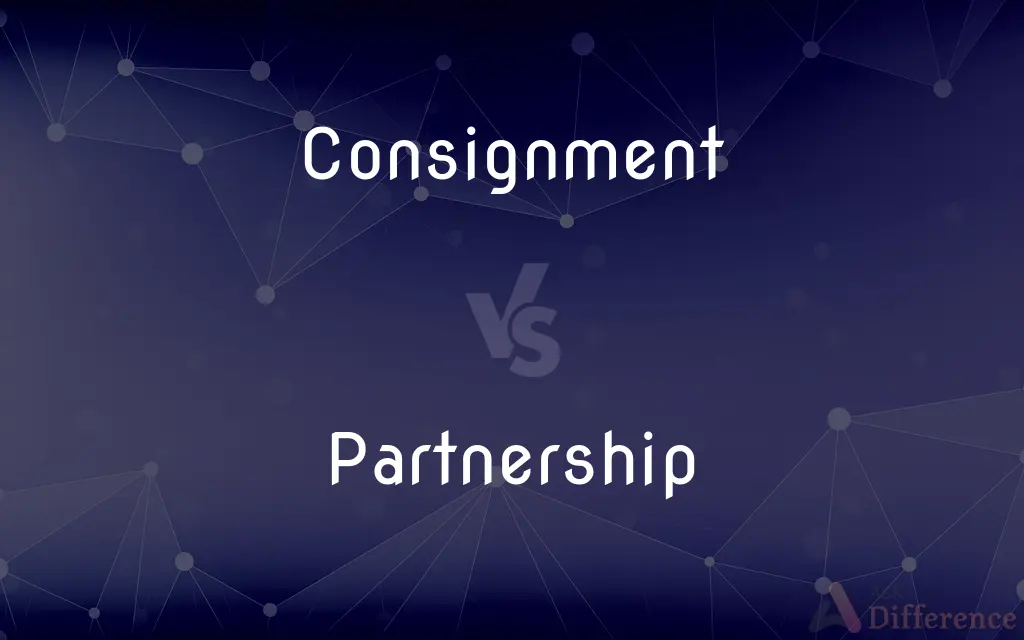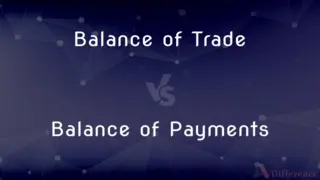Consignment vs. Partnership — What's the Difference?
By Tayyaba Rehman — Published on October 1, 2023
Consignment involves sending goods to a third party to be sold, while Partnership denotes a business operation between two or more individuals sharing management and profits.

Difference Between Consignment and Partnership
Table of Contents
ADVERTISEMENT
Key Differences
Consignment is a commercial arrangement where goods are shipped to a third party, referred to as the consignee, who subsequently sells these goods to end customers. Meanwhile, Partnership represents a business structure where two or more people collectively own and manage a business, sharing in the profits and losses. Each term thus embodies unique facets of business relationships, where consignment revolves around a product-based interaction and partnership leans towards shared management and financial dealings.
The focal point of Consignment is the transfer of goods to a consignee, with payment to the sender, or consignor, only occurring once the goods are sold. This transactional relationship doesn't imply shared ownership or joint business management, which is intrinsic to a Partnership, where all parties are collectively invested in the business operation, mutually navigating through its managerial and financial dimensions.
In a Consignment arrangement, the risk remains primarily with the consignor until the goods are sold, as they retain ownership of the items, while in a Partnership, all parties involved share the risks, responsibilities, and rewards of the business, collaboratively steering it towards its objectives. These dynamics highlight a critical distinction in risk distribution, where consignment localizes risk with the consignor and partnership diffuses it among all partners.
Consignment essentially segregates the roles of owning goods and selling them, where the consignor provides the items and the consignee facilitates the sale. Contrarily, Partnership mingles the roles of all parties involved, culminating in a singular entity that operates, manages, and assumes accountability for the business in unison. These distinct structures underline the dichotomy where consignment bifurcates roles based on ownership and sales, while partnership amalgamates all business facets among the partners.
Through Consignment, a consignor can expand market reach by leveraging the consignee's retail space or customer base without sharing ownership of the goods or the proceeds from their sale. Partnership, however, naturally implicates shared ownership, requiring all partners to entwine their resources, efforts, and expertise to nurture the business, embodying a holistic alliance rather than a segregated transactional relationship.
ADVERTISEMENT
Comparison Chart
Consignment vs. PartnershipDefinition
Transfer of goods for sale, payment upon sale
Joint business ownership and management
Ownership
Retained by consignor
Shared among all partners
Risk
Borne by consignor until sale
Distributed among all partners
Profit Distribution
Not shared, paid to consignor after sale
Divided among partners per agreement
Legal Entity
Not a separate legal entity
Can be a separate legal entity depending on jurisdiction
Compare with Definitions
Consignment
Sending goods to be sold, without transferring ownership.
His products gained visibility through Consignment at retail stores.
Partnership
Joint business ownership with shared management and profits.
Through Partnership, they launched a successful restaurant chain.
Consignment
Shipment of goods for sale, with payment upon sale.
The boutique sold dresses on Consignment from various designers.
Partnership
A collective business endeavor involving shared risk and reward.
The Partnership encountered challenges but prevailed through collaborative problem-solving.
Consignment
A transaction where goods are sold by a third party.
The artist sent a Consignment of paintings to the gallery.
Partnership
A business entity formed by two or more individuals.
Their Partnership thrived due to shared goals and complementary skills.
Consignment
The act of consigning.
Partnership
An alliance where business responsibilities and gains are shared.
In their Partnership, each partner brought unique expertise to the table.
Consignment
Something consigned.
Partnership
The state of being a partner.
Consignment
A collection of goods to be sent, in transit or having been sent.
Partnership
A business entity in which two or more co-owners contribute resources, share in profits and losses, and are individually liable for the entity's actions.
Consignment
The act of consigning.
Partnership
The persons participating in such a business entity.
Consignment
The sale of one's own goods (clothing, furniture, etc.) through a third-party vendor, in exchange for a portion of the sale price, and with the consigner retaining ownership of the goods until they are sold or abandoned.
Partnership
A relationship between individuals or groups that is characterized by mutual cooperation and responsibility, as for the achievement of a specified goal
Neighborhood groups formed a partnership to fight crime.
Consignment
The act of consigning; consignation.
Partnership
The state of being associated with a partner.
Consignment
The act of consigning or sending property to an agent or correspondent in another place, as for care, sale, etc.
Partnership
An association of two or more people to conduct a business
Forge a partnership
Consignment
That which is consigned; the goods or commodities sent or addressed to a consignee at one time or by one conveyance.
To increase your consignments of this valuable branch of national commerce.
Partnership
(cricket) The period when two specific batsmen are batting, from the fall of one wicket until the fall of the next; the number of runs scored during this period,
Consignment
The writing by which anything is consigned.
Partnership
The state or condition of being a partner; as, to be in partnership with another; to have partnership in the fortunes of a family or a state.
Consignment
Goods carried by a large vehicle
Partnership
A division or sharing among partners; joint possession or interest.
Rome, that ne'er knew three lordly heads before,First fell by fatal partnership of power.
He does possession keep,And is too wise to hazard partnership.
Consignment
The official act of consigning a person to confinement (as in a prison or mental hospital)
Partnership
An alliance or association of persons for the prosecution of an undertaking or a business on joint account; a company; a firm; a house; as, to form a partnership.
Consignment
The delivery of goods for sale or disposal
Partnership
A contract between two or more competent persons for joining together their money, goods, labor, and skill, or any or all of them, under an understanding that there shall be a communion of profit between them, and for the purpose of carrying on a legal trade, business, or adventure.
Consignment
Goods sent to be sold, retaining ownership until sale.
The consignor lost no money as unsold Consignment items were returned.
Partnership
The members of a business venture created by contract
Consignment
An agreement where payment is rendered upon sold goods.
Through Consignment, her crafts reached a wider customer base.
Partnership
A contract between two or more persons who agree to pool talent and money and share profits or losses
Partnership
Collaborative business operation and financial investment.
Their Partnership fostered innovation and resourceful business solutions.
Common Curiosities
What defines a Partnership in business?
A Partnership is a business structure where two or more individuals own, manage, and share the profits and losses of a business.
What does Consignment involve?
Consignment involves sending goods to a third party (consignee) to be sold, with payment to the sender (consignor) occurring upon sale.
Who bears the risk in a Consignment?
The consignor bears the risk in Consignment as they retain ownership of goods until they are sold.
Is the consignee responsible for unsold goods in Consignment?
Generally, no. Unsold goods in Consignment are typically returned to the consignor.
How are profits distributed in a Partnership?
Profits in a Partnership are typically distributed among the partners based on an agreed-upon ratio or percentage.
Share Your Discovery

Previous Comparison
Balance of Trade vs. Balance of Payments
Next Comparison
Rice Bran vs. Rice HuskAuthor Spotlight
Written by
Tayyaba RehmanTayyaba Rehman is a distinguished writer, currently serving as a primary contributor to askdifference.com. As a researcher in semantics and etymology, Tayyaba's passion for the complexity of languages and their distinctions has found a perfect home on the platform. Tayyaba delves into the intricacies of language, distinguishing between commonly confused words and phrases, thereby providing clarity for readers worldwide.
















































